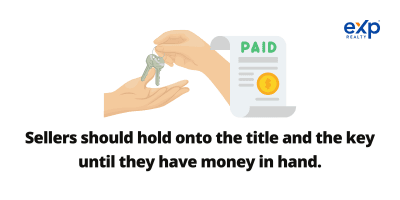A dry closing is when the buyer and the seller in a real estate transaction agree to close on a house before money has changed hands. In effect, the seller is willing to wait a few days after closing before receiving payment for their house. In most cases, a dry closing is neither the buyer’s nor the seller’s preference but can occur due to a variety of factors that have nothing to do with the seller’s credibility. Let’s dig a little deeper into what a dry closing is in real estate.
Why Are There Dry Closings?

Most people assume that when you sell your house, you’ll get your money upon closing. This is called a ‘wet closing,’ and in most states, every real estate transaction ends this way. In a perfect world, every closing would be a wet closing, but in the lengthy and complicated closing process, problems arise that might make it impossible for the buyer to provide the funds on the closing day. Rather than ditch the deal altogether and argue over who gets the earnest money, both parties can agree to wait a specified time, usually two or three business days, for the money to come through.
Most of the time, the cause of a dry closing originates either in the buyer or the lender. What happens is somehow the funds needed by the buyer to pay the seller get delayed. This can be the result of everything from a simple glitch in the payment process that might take time for the lender to work out; the buyer needing to satisfy an outstanding condition to get approved for a mortgage, or the seller having a similar issue with their own property that is keeping a condition of the sale from being met.
Why Would The Seller Accept A Dry Closing?
 The ultimate purpose of the dry closing is to keep the deal on the table and make sure that the buyer gets the house and the seller gets their money. In this way, a dry closing can be a better alternative to wet closing where, if the seller doesn’t get their money on closing day, the deal cannot go through.
The ultimate purpose of the dry closing is to keep the deal on the table and make sure that the buyer gets the house and the seller gets their money. In this way, a dry closing can be a better alternative to wet closing where, if the seller doesn’t get their money on closing day, the deal cannot go through.
In hot, dry and wet funded markets like California real estate, where buyers are placing competitive bids on homes, a seller might be more attracted to a higher bid that will require a dry closing than a lower, cash-in-hand bid that is sure to be a wet closing.
Ultimately it comes down to trusting the buyer and their respective broker. Remember that a dry closing is not an immediate sign that you should write off the buyer as untrustworthy. Sometimes things go awry in the deal and funding does not arrive on time. That doesn’t mean it won’t arrive at all, and in these cases, it’s fine to close first and get your money a few days later.
Why is the Lender So Important in a Dry Closing?
It might seem like the lender has undue influence in the closing process of a real estate transaction if you’re still a bit uncertain about their role between buyer and seller. Let’s review what a lender does. Nine times out ten, a buyer looking to purchase a home from a seller does not have enough money on hand to pay the seller. To get more money, the buyer goes to a lender and borrows money from them in the form of a loan. To get the loan, the buyer puts their house up as collateral so that if things fall through in the future, and if the buyer can’t pay back their mortgage or loan, the lender can repossess the house and make their money back.
So you see that the seller is not necessarily being paid by the buyer, but instead by the lender. So if there’s a delay in the lender getting the loan to the buyer, it might be wise to have a dry closing while the lender works out its issues.
What Should The Seller Do During a Dry Closing?
 Though most of the time the root of a dry closing in real estate is found between buyer and lender, sometimes the seller can be the one to make it necessary for funding to be delayed until after closing.
Though most of the time the root of a dry closing in real estate is found between buyer and lender, sometimes the seller can be the one to make it necessary for funding to be delayed until after closing.
Sellers should not relinquish the title and thus the possession of their home upon a dry closing. They should hold onto the title and the key until they have money in hand. It’s good to keep the title until the last minute only because if, in the very unlikely chance that funding fails to come through, it can be a bit of a pain to get the title back from the buyer if it has been transferred to them.
What Is A Dry Closing in Real Estate?
The only difference between a dry closing and ‘normal’ wet closing is that the seller gets paid after the closing documents have been signed and mortgage requirements are met by the buyer. Dry closings occur only when both the seller and the buyer have agreed to have one. They are meant to keep the deal going forward when circumstances that would normally cause either buyer or seller to back out of the deal occur. Finally, dry closings are legal only in a few select states.





